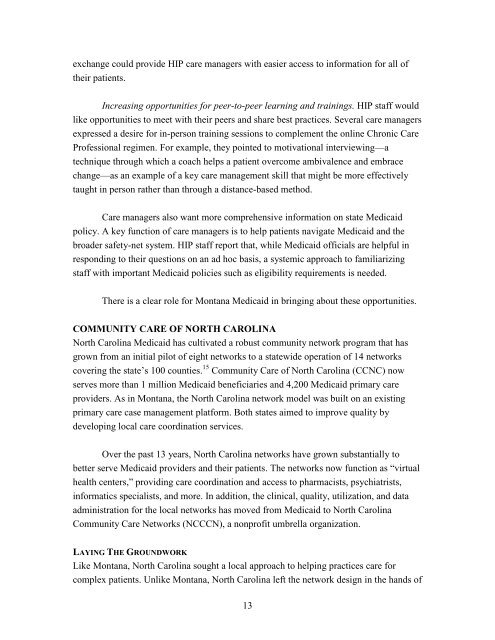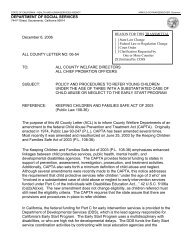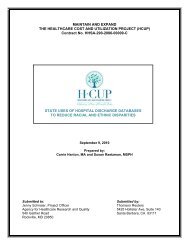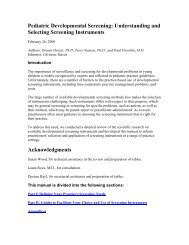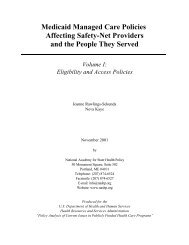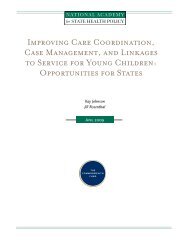Developing Federally Qualified Health Centers into Community ...
Developing Federally Qualified Health Centers into Community ...
Developing Federally Qualified Health Centers into Community ...
You also want an ePaper? Increase the reach of your titles
YUMPU automatically turns print PDFs into web optimized ePapers that Google loves.
exchange could provide HIP care managers with easier access to information for all of<br />
their patients.<br />
Increasing opportunities for peer-to-peer learning and trainings. HIP staff would<br />
like opportunities to meet with their peers and share best practices. Several care managers<br />
expressed a desire for in-person training sessions to complement the online Chronic Care<br />
Professional regimen. For example, they pointed to motivational interviewing—a<br />
technique through which a coach helps a patient overcome ambivalence and embrace<br />
change—as an example of a key care management skill that might be more effectively<br />
taught in person rather than through a distance-based method.<br />
Care managers also want more comprehensive information on state Medicaid<br />
policy. A key function of care managers is to help patients navigate Medicaid and the<br />
broader safety-net system. HIP staff report that, while Medicaid officials are helpful in<br />
responding to their questions on an ad hoc basis, a systemic approach to familiarizing<br />
staff with important Medicaid policies such as eligibility requirements is needed.<br />
There is a clear role for Montana Medicaid in bringing about these opportunities.<br />
COMMUNITY CARE OF NORTH CAROLINA<br />
North Carolina Medicaid has cultivated a robust community network program that has<br />
grown from an initial pilot of eight networks to a statewide operation of 14 networks<br />
covering the state’s 100 counties. 15 <strong>Community</strong> Care of North Carolina (CCNC) now<br />
serves more than 1 million Medicaid beneficiaries and 4,200 Medicaid primary care<br />
providers. As in Montana, the North Carolina network model was built on an existing<br />
primary care case management platform. Both states aimed to improve quality by<br />
developing local care coordination services.<br />
Over the past 13 years, North Carolina networks have grown substantially to<br />
better serve Medicaid providers and their patients. The networks now function as ―virtual<br />
health centers,‖ providing care coordination and access to pharmacists, psychiatrists,<br />
informatics specialists, and more. In addition, the clinical, quality, utilization, and data<br />
administration for the local networks has moved from Medicaid to North Carolina<br />
<strong>Community</strong> Care Networks (NCCCN), a nonprofit umbrella organization.<br />
LAYING THE GROUNDWORK<br />
Like Montana, North Carolina sought a local approach to helping practices care for<br />
complex patients. Unlike Montana, North Carolina left the network design in the hands of<br />
13


